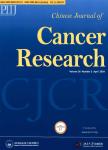Precision screening for esophageal squamous cell carcinoma in China
Precision screening for esophageal squamous cell carcinoma in China作者机构:Key Laboratory of Carcinogenesis and Translational Research(Ministry of Education/Beijing)Laboratory of GeneticsPeking University Cancer Hospital&InstituteBeijing 100142China
出 版 物:《Chinese Journal of Cancer Research》 (中国癌症研究(英文版))
年 卷 期:2020年第32卷第6期
页 面:673-682页
核心收录:
学科分类:1002[医学-临床医学] 100214[医学-肿瘤学] 10[医学]
基 金:the charity project of the National Ministry of Health(No.201202014) the National Key R&D Program of China(No.2016YFC0901404) National Science&Technology Fundamental Resources Investigation Program of China(No.2019FY101102) the National Natural Science Foundation of China(No.82073626) the Digestive Medical Coordinated Development Center of the Beijing Municipal Administration of Hospitals(No.XXZ0204)
主 题:Esophageal cancer organized screening opportunistic screening cost-effectiveness risk stratification
摘 要:Esophageal squamous cell carcinoma(ESCC)is the predominant subtype of esophageal cancer in China,and this neoplasm is associated with high morbidity and mortality as well as clear geographical *** primary prevention for ESCC lacks a clear intervention target,secondary prevention,also known as screening and early diagnosis and early treatment,has become the mainstay of ESCC prevention and control in *** screening in China has been subject to decades of evaluation and ***,the ESCC screening strategy currently adopted in China has encountered a developmental *** this review,we have summarized studies and significant findings for ESCC screening and proposed advancement of screening strategies as follows:1)evidence from randomized controlled trials is needed to support the effectiveness and health economic value of endoscopic screening for ESCC;2)the current traditional screening and surveillance strategies warrant reform,and a risk-prediction-based precision strategy should be established;and 3)a deeper understanding of the value of opportunistic screening in the prevention and control of ESCC in China is called *** to the low absolute prevalence of precancerous lesions,substantial investment of resources and nonnegligible risks of invasive screening techniques,precision and individualization should be the main direction of cancer screening programs for the *** advocate cooperation on the part of Chinese scientists to solve this major China-specific health problem in the next decades.



